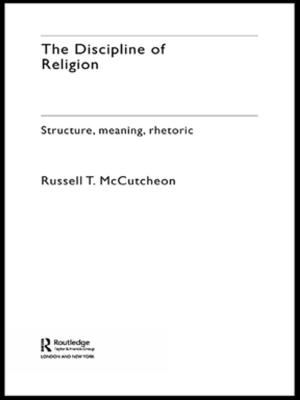Female Monastic Life in Early Tudor England
With an Edition of Richard Fox's Translation of the Benedictine Rule for Women, 1517
Fiction & Literature, Literary Theory & Criticism| Author: | ISBN: | 9781351936705 | |
| Publisher: | Taylor and Francis | Publication: | December 5, 2016 |
| Imprint: | Routledge | Language: | English |
| Author: | |
| ISBN: | 9781351936705 |
| Publisher: | Taylor and Francis |
| Publication: | December 5, 2016 |
| Imprint: | Routledge |
| Language: | English |
This gendered translation of the Benedictine Rule for women in 1517 is also a handbook for women on exercising authority, management skills and the art of good governance, including monastic property and relations with the outside world. Barry Collett here provides a modern facsimile edition of Fox's translation, written in the tumbling phrases of passionate prose that make Fox stand out as a literary figure of the English Renaissance. Collett also provides an extensive introduction that argues that Fox's experience as an administrator and senior political adviser with special responsibility for foreign affairs, mainly with Scotland and France, the political situation in 1516, and social concerns Fox shared with Thomas More, all provide keys to understanding this translation of the rule. Richard Fox was king's secretary, Lord Privy Seal and Bishop of Winchester, and founder of Corpus Christi College in Oxford. He was an administrator who reflected much on the proper exercise of authority and responsibility at all levels, especially through negotiated co-operation. He strongly supported monastic reforms, and when a group of abbesses requested a translation for sisters unable to understand Latin, this was his response. It provides a unique window into the world of female spirituality just a few months before Luther's reformation began. The exercise of God-given authority by women is described in the same-possibly stronger-terms as for men. Fox expressed no reservations about the exercise of authority by women. His indifference to sexual distinctions arose, paradoxically, from his preoccupation with the skilful use of God-given functioning of authority in a hierarchical society.
This gendered translation of the Benedictine Rule for women in 1517 is also a handbook for women on exercising authority, management skills and the art of good governance, including monastic property and relations with the outside world. Barry Collett here provides a modern facsimile edition of Fox's translation, written in the tumbling phrases of passionate prose that make Fox stand out as a literary figure of the English Renaissance. Collett also provides an extensive introduction that argues that Fox's experience as an administrator and senior political adviser with special responsibility for foreign affairs, mainly with Scotland and France, the political situation in 1516, and social concerns Fox shared with Thomas More, all provide keys to understanding this translation of the rule. Richard Fox was king's secretary, Lord Privy Seal and Bishop of Winchester, and founder of Corpus Christi College in Oxford. He was an administrator who reflected much on the proper exercise of authority and responsibility at all levels, especially through negotiated co-operation. He strongly supported monastic reforms, and when a group of abbesses requested a translation for sisters unable to understand Latin, this was his response. It provides a unique window into the world of female spirituality just a few months before Luther's reformation began. The exercise of God-given authority by women is described in the same-possibly stronger-terms as for men. Fox expressed no reservations about the exercise of authority by women. His indifference to sexual distinctions arose, paradoxically, from his preoccupation with the skilful use of God-given functioning of authority in a hierarchical society.















